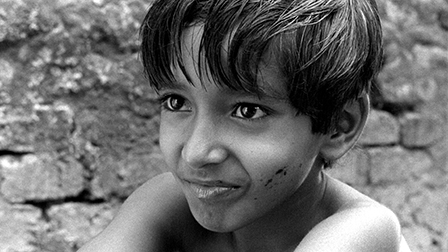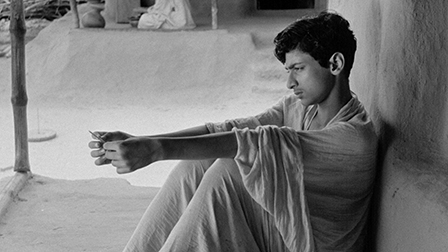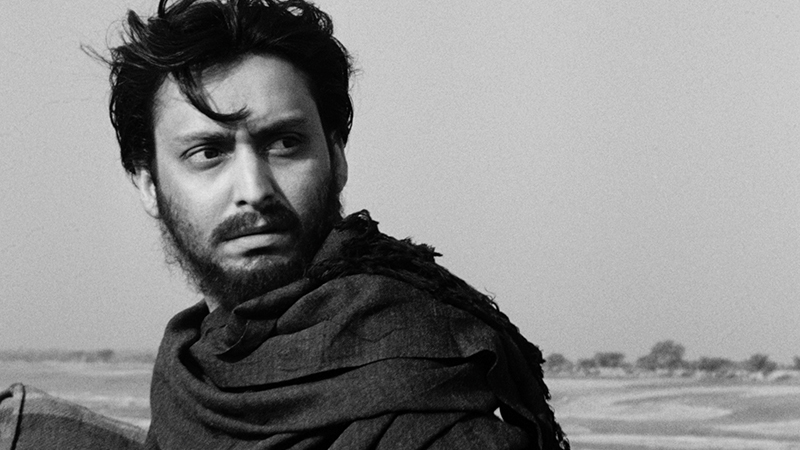The Apu Trilogy is famous for its simple story about the life of a Bengali boy. Whether this was the intention from the beginning isn't known - the first film seems to focus more on family life, in particular a poor family in a small village whose life are constantly subject to the winds of fortune. The ever-optimistic father and overly-cautious mother set the tone for the series.
Pather Panchali (1955)

The Star Wars of the series, so to speak, roughly translates to the "Song of the Little Road." The road likely refers to a path that through the forest that separates Apu's family from their more affluent neighbors. No one is super-rich in the village, but the differences in wealth in a caste-based country like India still take a toll on a family's pride. When the movei begins, we are introduced to Apu's sister Durga before she even is a big sister. She's a thief and a troublemaker, although you have to wonder how else she would occupy her time without school. She certainly doesn't help the tension between her family and the neighbors, who appear to be related some way that is never explained. There is also an elderly character everyone calls "Auntie" who has no possessions and drifts from one location to another. As horrifying as that might seem today, she takes everything in stride. Always complaining but never despairing.
The movie is in no hurry. Many camera shots just linger and we get a sense of the slow pace of village life. One shot shows two of Durga's kittens play-fighting in the corner and nothing else, which would surely be cut in a film made today. Ray keeps in it because, well, why not? Animals are a big part of village life.
Eventually Apu comes in the picture and is immediately exalted to prince status. Durga does a lot for him, whether by direction or desire is never made clear. It is a given that she will get married and he will be educated... everyone seems okay with this. That still doesn't stop her from being an annoying big sister. Watching the two of them playing together provide some of the most uplifting scenes in the movie, which is a bit of a downer overall. The mom is constantly worried but does not burden her kids with the family problems.
A sense of dread arrives in the viewer when the father leaves a second time to find work. Funds get low and the mother, tired of the condescension from her neighbors, refuses to ask for more help. She sells her possessions and still can't provide for her kids while waiting to her from her well-intentioned, but absent husband. The family is barely getting by and looming natural disasters are bound to make things worse.
That's as far as I'll go with the story, although a few spoilers are inevitable in the second film Aparajito . Suffice it to say, all does not go according to the father's plan. This film is considered a classic in its own right, receiving votes in the famous Sight and Sound film poll conducted every ten years, and would likely be remembered even without the two films that followed. A few scenes remain iconic, particularly the one where the two children watch a train pass for the first time. Simple really can be better.
Aparajito(1956)

The second film, often referred to by the English title The Unvanquished begins with the family, sadly without Durga, relocating to the city of Benares. The first long shot already has more people in it than the entire film of Pather Panchali. Since the father had moved a few times between the village and the big city, he knew there would be work here and he would no longer need to travel. This doesn't mean the family troubles are over, although the mother is definitely happier in the new environment.
Apu has grown quite a bit and is portrayed by a new actor while the parents are the same. Their personalities are unchanged - the father is eternally positive while the mother prepares for the worst, even though both hold steadfast to their belief that what must happen, will happen. The family seems to adjust well to their new life, even though Apu does not go to school.
Time moves on and the father's health deteriorates, likely from overwork. He truly believes in spirtual healing and does not want to be a burden to his family, so he refuses a doctor's help until it is too late. He ignores his wife's advice and goes to work when he really shouldn't, and tragedy strikes the family again. It's a little maddening at this point, especially if you've seen the films multiple times... both deaths could have likely been prevented. It's hard not to be a little judgmental when you've grown fond of the characters.
The mother still has options - she can work or she can rely on her family nearby. They move to a smaller town, but Apu's welfare is always her first concern and soon he wants to return to school. Her willingness to sacrifice for him and his coldness as a response shape the rest of the movie. It also explains a lot of the universality of the films... how many parents feel the same way today?
In fairness, Apu is a very hard worker throughout. He works as a priest in the morning, his father's profession, and attends school in the afternoon. He loves his mother, but he thinks time is abundant and she knows better. The separation between these two characters, who are all they have, is hard to watch. Yet it is a necessary part of life. The school quickly recognizes Apu's talent as he is given more opportunities to learn. Eventually, he is awarded a scholarship in Calcutta and will need his mom's help to attend full-time. In the only scene that rings false, the mother berates him for wanting to leave before admitting she had the money all along. Once that is established, the rest of the film writes itself. Apu gets more caught up in schoolwork and less interested in coming home. The mother gets lonelier and sicker, and the ending is all too predictable. Going into adulthood, Apu will be on his own.
Aparajito is certainly a more complex film than Pather Panchali, but it still doesn't try to do too much. Children are born, grow up, and move on. In this case, Apu is bound for greatness and his family is unwilling to stand in his way, regardless of what sacrifices they have to make. And that story remains timeless.
Apur Sansar (1959)

A full three years passes, in real time, between Aparajito and the third film, which goes by the bland English title World of Apu. The first two films are critically acclaimed, so the expectations are very high for this one. Certainly funding will not be a problem and this film will have a better look and better production values. But will it stand up to the first two in terms of storytelling? Surprisingly, it does. In fact, many people, including me, consider Apur Sansar to be the best of the trilogy. Ray was more than up to the challenge.
Apu leaves university with solid references but without a terminal degree. He stays in Calcutta and seems to enjoy the life of a vagrant, even chiding his school friend Pulu for his boring, yet stable career as an engineer. No one is too interested in hiring Apu, as he is either not qualified or, more likely, too qualified to fit into a position. (Any college graduates today that may sympathize?) Still, he keeps his father's optimism that everything happens for a reason.
A very unexpected turn occurs when Apu accompanies Pulu to hs cousin Aparna's wedding. Apu is greetly warmly by people he has never met, an ominous sign for someone who doesn't believe in coincidence. When the groom arrives and is in no condition to be married, the family needs a replacement groom or the bride will be cursed forever. You read that right. A replacement groom. The guy can re-marry at a later time, but the girl is now or never. Apu steps in and somehow a wandering bachelor leaves with a young wife.
Artificial? Perhaps... but given how many marriages were arranged then (and now, I'm sure), it's likely this scenario has actually occurred before. His new bride Aparna (played by a 14-year old) is infinitely adaptable and unfazed leaving her wealthy life to live in Apu's spartan environment. He begins to take life more seriously while all she wants is to have him nearby.
In the last scene before she returns home to deliver their child, he tells her that she means more to him than his writing. That is the highest compliment he could possibly give, and she replies by lighting his cigarette after scolding him for smoking before. Sometimes I wish they would have just ended the film here... yeah, it wouldn't have even been a feature-length film at this point, but it would have created a feel-good ending most audiences insist upon. And just as likely, the trilogy would be forgotten. It has to continue.
Apu's life takes another tragic turn and this time he is not as resilent. He has no one to turn to, except acquaintances who offer unhelpful advice like he could "marry ten times over if he wanted." Eventually he hits the road again, finding work where he can and sending money to a son he has never met. He still equates money with duty and fears that he will blame his son for the death of his wife. Pulu finally tracks him down and lets him know that his son, Kajal, needs him. Apu can only promise to send more money.
The final scenes of this film elevate the series from excellent to transcendent. Whether you sympathize with Apu or not, he believes that Kajal needs to make his own decision. No one knows what the future holds for these two, but they are not afraid.